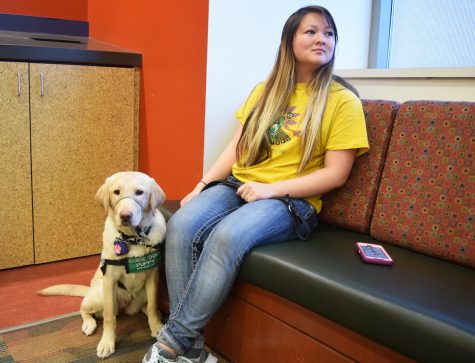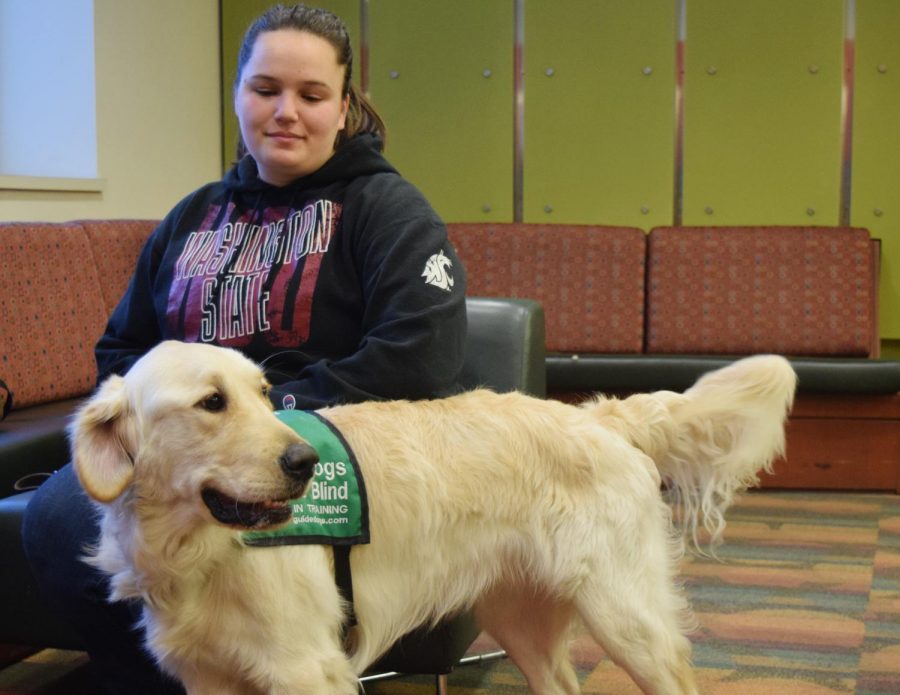Raised from puppy to guide dog
Club affiliate breeds young dogs, teaches basic obedience skills for them to become vigilant guides
MICHAEL LINDER | THE DAILY EVERGREEN
Co-leader Chandler Fish and her guide dog in training, Mick, explains her experience working for the guide dog training program.
March 2, 2018
The members of Guiding Paws of the Palouse, a local WSU club affiliate of the Guide Dogs for the Blind organization, know a great a deal about training guide dogs. Guiding Paws meets three times a month to work with the puppies and takes responsibility for raising, training and socializing future guide dogs.
Chandler Fish, co-leader of Guiding Paws, said the process of becoming a guide dog is a bumpy road that begins before the puppy is ever born. All dog candidates are bred specifically to become guides.
“Ninety-nine percent of our puppies are bred through guide dog lines,” Fish said.
Fish said they select dogs with the best genetics, temperament and trainability and raise them alongside the other dogs. These are the ones selected as breeders.
Training begins after the dog’s potential for becoming a sufficient guide or breeder is evaluated. Fish said the training process can be broken down into four stages.
In the first stage, the puppies are exposed to various sounds, unfamiliar objects and basic puppy socialization practices.
During the second and longest stage, Fish said, the puppies will be sent to puppy raisers like Guiding Paws. In this stage, they begin to learn basic obedience skills.
“When we first get them, they don’t know how to do anything really except run around and be puppies,” Fish said, “so we teach them all of their commands through positive reinforcement.”
Training puppies to be future guides can be a difficult task, but the members of Guiding Paws welcome the challenge.
“We are probably the craziest people you will ever meet,” Fish said.
She said once they receive an excitable puppy, they put it through a fast-paced process of basic training skills. They are challenged to finish before they get another puppy and start the cycle over.
In the third phase, the dogs return to the Guide Dogs campus to begin what they call formal training. During this stage, the dogs will learn more specialized skills, like intelligent disobedience, which is necessary for guide dogs in particular. For example, if a dog were guiding a client and spotted a car in their path, they would be trained to ignore commands so as to keep their person safe.
The final stage of training is the class phase. At this stage, Fish said, the dog will be matched with a client, and they will spend the next two weeks learning to be a team.
Despite the exhaustive process, only about 50 percent will become guides, Fish said. When considering that success rate, training guide dogs is not cheap.
“From the time a puppy is born and to the time it’s recalled, it’s $11,000 a puppy,” Fish said. “Each dog that is graduating is worth $35,000 to $40,000.”
But the organization remains nonprofit. “Everyone that gets a dog from Guide Dogs gets the dog for free,” Fish said.
She added they continue to support the dog for its entire career until they retire. Retirement doesn’t become necessary until there is a noticeable change in abilities.
While becoming a guide may be a difficult path for the puppies, Lindsey Chalem, Guiding Paws public relations officer, said the process of becoming an owner is just as tedious.

Lindsey Chalem, Guiding Paws’ public relations officer, sits with her guide dog in training, Waffle.
Potential owners go through an extensive application process, Chalem said, which includes online paperwork, a phone interview and a home check.
“They really care about their dogs,” she said.
For the members of Guiding Paws, the ultimate reward comes at graduation, when the puppies they raised are now fully trained. As one of the few Guide Dogs schools to hold formal graduations, it provides the trainers a joyful opportunity to say goodbye to the puppies, she said.
“For us puppy raisers, it’s kind of like the end chapter,” Chalem said. “We get to close the book, we get to meet who they are going to be with. It’s a very special moment. If you ever have the chance to go to graduation, there is something in the air. It’s a magical moment; you really can’t describe it.”
She said saying a final goodbye to a friend is sad, but she also feels happy and proud to have raised the puppy to this point.
“You’re just really excited to see them go out in the world and kick butt,” Fish said.









